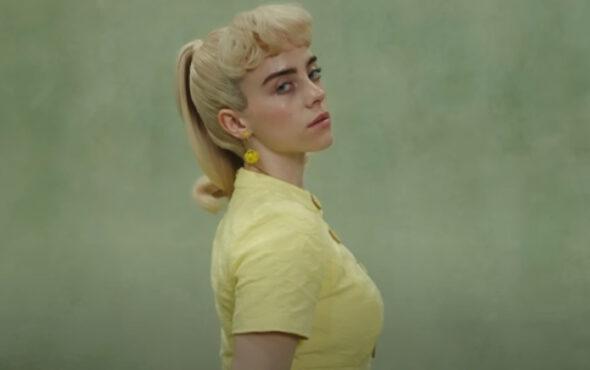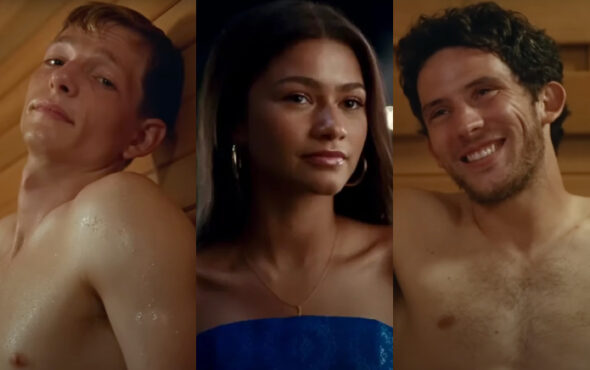
Gender-neutral ideations are not a new concept, so it wasn’t a surprise when the BRITs moved towards categories that would be broadly more inclusive of genders outside of the “male” and “female” spectrum. Last year, the BRITs faced criticism after Sam Smith raised their frustrations after being excluded from the awards due to their gender identity. “Music for me has always been about unification not division. I look forward to a time where award shows can be reflective of the society we live in,” the star posted online. “Let’s celebrate everybody, regardless of gender, race, age, ability, sexuality and class”. Now, non-binary musicians like Smith, such as Demi Lovato, King Princess and Dorian Electra, are eligible for the BRITs thanks to the British singer’s vocal advocation for inclusivity.
However, while the UK’s biggest award show has made a notable leap, it’s not the first to do so. Last year, the Gotham Film and Media Institute, the hosts of the Gotham Awards, announced they would be moving towards gender-neutral categories. The awards made a visible effort, even readjusting the name of the Breakthrough Actor honour to Breakthrough Performer. These 2021 moments may feel like breaking the glass ceiling, however, this movement was initiated long ago. In 1997, the TCA Awards, presented by the Television Critics Association, went ahead with gender-neutral categories. The awards opted for categories such as Individual Achievement in Drama to recognise talent in a genderless approach.
As the BRITs and Gotham Awards move towards a format with greater representation, it’s worth noting some of the biggest pop culture platforms have done so too. The Grammys notably have been gender-neutral since 2012. Similarly, the MTV Video Music Awards (VMA’s) put an end to gendered award categories in 2017. Last year, the ARIAs, Australia’s biggest music awards event, opted to scrap the Best Male and Best Female categories. Even the Emmys, known as a trailblazing award ceremony, went for the use of the neutral noun “performer” instead of gendered descriptors. This was done in a nod to acknowledge non-binary actors, however, the chosen performer could still end up in a gendered category. The entertainment industry is making a gradual shift towards being more accepting of diverse identities. As attitudes towards gender-neutral categories become accepted and implemented, data has shown the notion is being reflected in audiences too. According to a survey conducted by YouGov, 47 per cent of Britons agree that music award shows should ditch their separate categories for men and women and, instead, offer a combined prize.
47 per cent of Britons agree that music award shows should ditch their separate categories for men and women and, instead, offer a combined prize.
The question of gender-inclusive categories doesn’t stop with the music industry. Most literary awards – such as the Booker Prize – are open-ended and available to any entree. However, many Britons suspect the combination approach is more likely to result in male winners dominating the categories. While we eagerly applaud the TCA’s for its gender-neutral progress, since its implementation of combined categories, 69 per cent of the award wins have gone to men. In recent years, data has been much more promising with women receiving more submissions for awards. The British Academy of Film and Television (BAFTA) hosts the prestigious public-voted Rising Star Award. The award, which launched in 2004 to mark the memory of Mary Salway, has overwhelmingly been in favour of male actors, despite not being gender-specific. Since its inception, 11 men have won the award compared to five women in the last 17 years. Data, collected by YouGov, also shows public opinion on gender-neutral categories within sports supports the belief that there will be more male winners. In fact, only 3 per cent of the study believed gender-neutral categories would lead to female winners, while a total of 35 per cent agreed the change would favour men.
As the debate on whether gender-neutral categories should be broadly adopted unfurls, it’s important to note inclusive categories haven’t always swayed in favour of male winners. Take the Grammys for example: in 2018, the Recording Academy said women need to “step up” to compete against male contenders. To no surprise, the statement was met with immediate backlash from artists and viewers. Up until 2018, 899 people have been nominated for the awards, and 9 per cent of them were women, as The New York Times highlighted. The following year, 2019, was an incredible win for female artists. Kasey Musgraves scooped up Album of the Year for Golden Hour, Dua Lipa received the Best New Artist award, Lady Gaga won Best Pop Solo Performance for Joanne, Billie Eilish was recognised for her breakthrough single Bad Guy, and Ariana Grande snagged Best Pop Vocal Album for Sweetener. Fears this could have been a one-off were unfounded. The 62nd Grammys held just as much promise. Billie Eilish took home a colossal five awards, Lizzo’s Truth Hurts won Best Pop Solo Performance and a win for Best Traditional R&B Performance with Jerome. Taylor Swift received Album of the Year and British artist Dua Lipa was awarded Best Pop Vocal Album for Future Nostalgia. While there was a notable landslide win for several artists, the awards were rightfully acknowledging killer female acts through nominations and award wins.
As another year of awards is rolling out, things are looking up. British act Holly Humberstone was named the BRITs Rising Star act — an award that previously went to Griff and Celeste. Let’s not forget Adele’s blockbuster album 30 is bound to sweep up awards across the board. As for international artists, there’s Taylor Swift, Lana Del Ray and Olivia Rodrigo on the cards. British icons Little Mix are also still nailing it. Not only was Jade Thirlwall given the GAY TIMES Honour for Allyship, but the band made history for landing a BRIT award for Best British Group; a win that recognised how female collectives have historically been overlooked. As we move towards these progressive pop culture moments, it’s a reminder of how far the music industry has come — and has to go.
As female artists are rightfully acknowledged for their contributions to the modern music scene, it’s vital we ensure this visibility across all artists. The BRITs adopting gender-inclusive categories is a start on the right path. As award ceremonies continue to follow suit, underrepresented voices such as non-binary performers will no longer feel misrepresented or overlooked in the system. Now, they too can walk away with awards rightfully in their name. Moving ahead, equal opportunities, visibility and recognition are crucial pillars to ensure an even industry playing field. So, as 2022 kicks in and nominations begin to pour through, we hope to see history continue to be made, but one that represents artists of all kinds.



